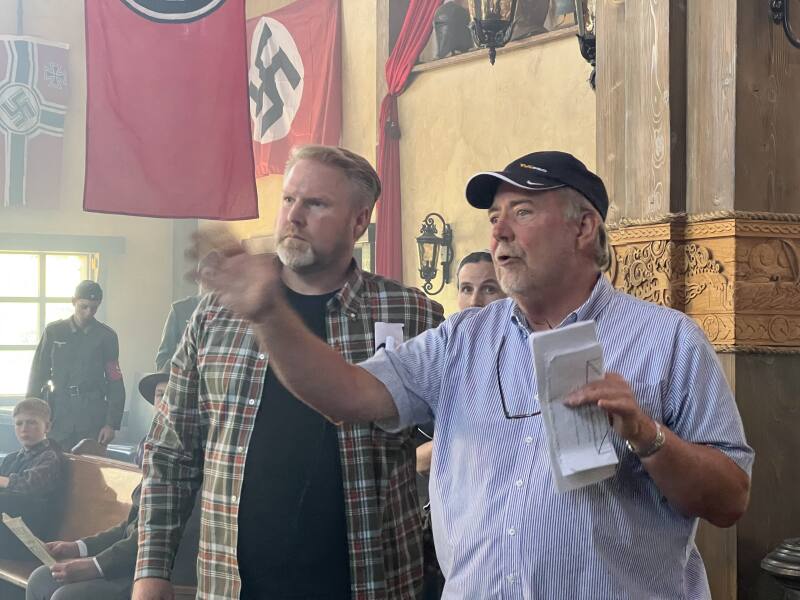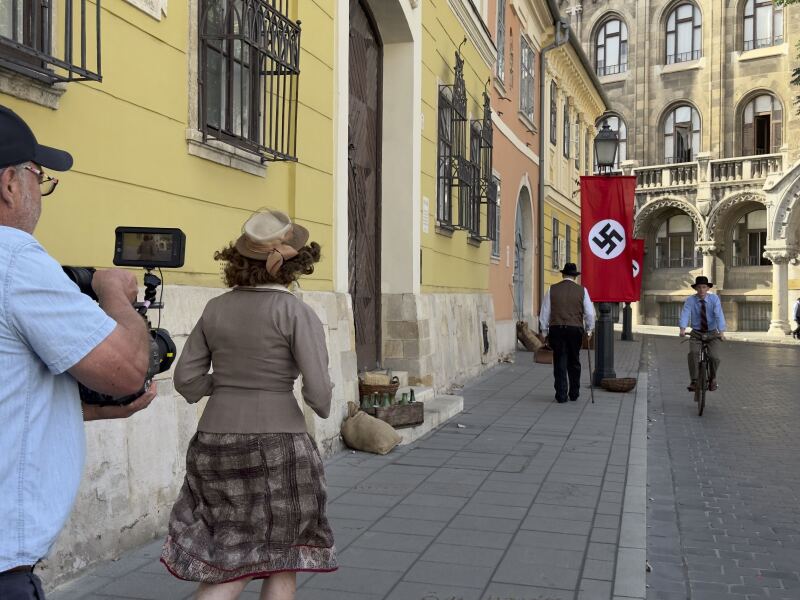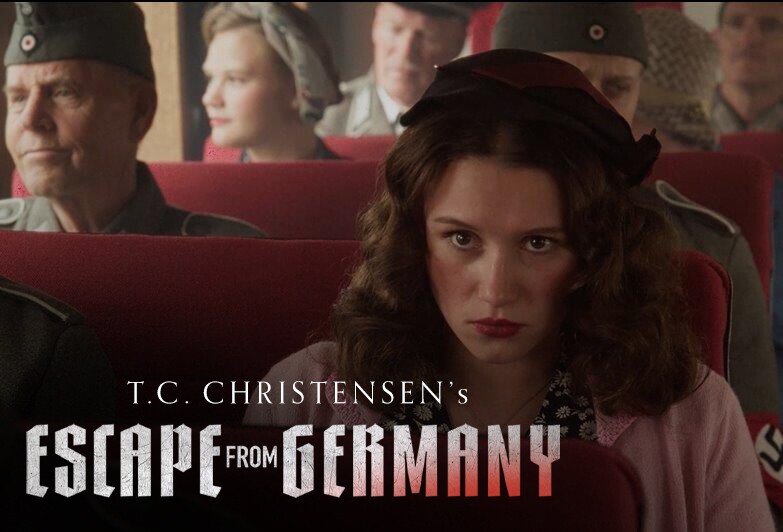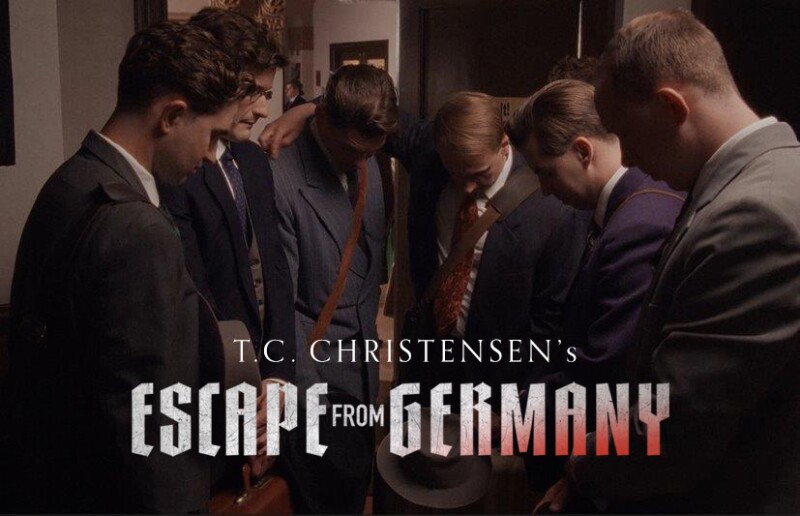Iconic Latter-day Saint films like 17 Miracles, The Cokeville Miracle, and The Fighting Preacher were all brought to life with director T.C. Christensen at the helm. And his next release might be the most action-packed yet.
Escape from Germany, in select theaters starting April 11, tells the little-known story of how 79 American missionaries miraculously escaped from Germany just hours before the breakout of World War II. The film is full of heart-stopping bravery, dedication, and faith—all based on true accounts.
From writing to funding to filming, a movie of this magnitude was no easy feat to pull off. Filming even required a trip to Budapest, Hungary, where a large historic train station provided the perfect set for critical scenes.
LDS Living recently spoke with T.C. Christensen and Paul Wuthrich (who plays the film’s star, Elder Seibold) about their experiences bringing this inspiring story to the big screen.
And as you might imagine, they experienced many miracles throughout the process. Here are just three.

1. A Not-So-Chance Meeting
Escape from Germany was filmed in Utah and Budapest, Hungary.
T.C. explains that they worked with a production company in Budapest that helped them gain access to train stations and provided other necessities to film. Before the trip, T.C. wired over the payment to the production company. But when he arrived with the cast and crew, the money had not been received yet—and the production company wouldn’t proceed without it. A delay in filming would be problematic and costly.
As the appointed day for filming approached, T.C.’s team waited anxiously, but no money came through.
“We were frustrated and didn’t know what to do,” T.C. says. “So [we] went to church on Sunday in Budapest, and one of the people we talked to was a Church member not from Budapest, but he’d been a missionary there and was visiting. He overheard us talking about the trouble, and he stepped in and said, ‘I have a way that I can get money into the country and take care of this problem for you.’ It took just a few hours, and boom—we had the money and were able to shoot. What are the chances? If we wouldn’t have met him, we would not have gotten the shots that we needed. It was a miracle.”
For Paul Wuthrich, filming in Budapest was also special for another reason:
“We had a fireside with the missionaries there. [And in the movie], you’ll see there’s this montage where Elder Seibold is finding elders … and those are actual missionaries serving in Budapest right now. They got permission from the mission president to come be missionaries in the film. … So we got to hang out with them and talk with them about the work, and it was just really cool to be with them on set,” Paul says.

2. The Lost Investor
According to T.C., one of the greatest challenges of creating Escape from Germany was finding the funding required for such a complex film.
“When you walk down the hall at a multiplex theater, you’re passing films that cost, I’d say, between 30 million and 200 million dollars. Our films have to be made for under a million dollars,” he says.
T.C. says that occasionally, people will approach him and offer to invest in future films. When that happens, he always writes down the individual’s name and carefully files it away.
Just as he was about ready to start on Escape from Germany, T.C. realized they did not have enough money. As he contemplated what to do, he remembered a man who had offered to invest. But upon looking through his files, T.C. couldn’t find the man’s name.
“I was kind of sick about it and disappointed in myself that I didn’t do what I always do and write it down,” he says.
T.C. had previously agreed to travel from his home in Utah to speak to a Latter-day Saint stake in Dallas, Texas. As he was sitting on the stand, in walked a woman who T.C. immediately recognized: she was the wife of the man who had offered to invest. T.C. was able to get the contact information he needed and ultimately got the funding necessary to make the movie.
“The coincidence of that is just too amazingly extreme,” T.C. says. “If I would have gone [to Dallas] a month later, it would have been too late. It was all just perfect.”’

3. The Extra Special Extras
Escape from Germany includes many background actors, and T.C. sought out special people for those roles.
“Eighty-five percent of the extras in this film are descendants of the actual missionaries this happened to,” T.C. says. “I love to have them on the set, we introduced them every morning. And they made me cry every morning because they’re there to honor their ancestor, and they bring a spirit to the set that helps us remember that this is a real story we’re telling.”

For Paul, having extras on the set was inspirational. Paul is not a full-time actor; he does commercial real estate management as a career. Between his career and his responsibilities as a husband and father, Paul is selective about his acting projects. Having the extras on set each day was a powerful reminder of why he agreed to do the film.
“T.C. did not have to take the time at the beginning of every day to introduce the descendants of these missionaries and … honor [their ancestors] while the clock is ticking and money is being spent. But he did it because this is more than just a movie—it’s an opportunity to put a good message out there, to bear my testimony, and to bring these inspiring stories to life. That’s why I keep acting in these films,” Paul says. (He has appeared in other Latter-day Saint films, including Witnesses and The Fighting Preacher.)
In addition to the extras, Paul was inspired by the character he played: Elder Seibold was asked by the mission president to find the missionaries scattered across Germany and help them get out. It was an assignment that continually put Elder Seibold in danger of becoming trapped himself or possibly even arrested.
“This is probably the closest to playing Nephi that I’ll ever get to do,” Paul says. “It’s just such a Nephi story. [Elder Seibold] is just going forth, not knowing beforehand what he’s going to do. And he was led by the Spirit. … If the Spirit told him to get off the train and go into the station, he got off. If the Spirit told him to stay on, he stayed on. … There’s a sense of urgency that propels you forward through the entire story. It’s an exciting part to play.”
Escape from Germany is a family-friendly film that will inspire prospective missionaries and all of us to accomplish the work God calls us to do.
“We are in a day and age where everybody needs so much validation for things that they’re doing,” Paul says, referring to how good deeds are sometimes flaunted on social media. “But there’s a lot of people out there doing great things that go unnoticed, but they’re heroic things. And [Elder Seibold] didn’t do it for the attention. Nobody was filming him. … He was called to do it, and he went and did it.
“And I remember feeling like that on my mission. I served in Sierra Leone, West Africa, and you get out there and nobody’s around. My companion said, ‘Nobody’s out here keeping watch. You could come out here and waste time all day, or you could come out here [and] work hard—nobody’s going to know but you and the Lord. So it’s up to you. Just go and do what you're called to do.’
“So I kind of love that aspect of [the movie]: sometimes we’re just called to do hard things. And whether anybody’s watching, we just go and do it. Because that’s what we’re called to do.”
Find Escape from Germany in a theater near you.



